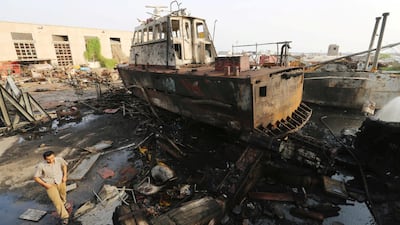Yemen's Houthi rebels are facing the loss of one of their most strategic assets as government forces close in on the port city of Hodeidah.
Hodeidah's port is Yemen's largest and the entry point for 90 per cent of its food imports and most of the humanitarian aid sent to the country. The city borders some of the most strategic Houthi-held areas and serves as the supply hub for tens of thousands of rebels, including those fighting in southern Yemen.
In 2015, the Saudi-led Arab coalition supporting the government found that the Iran-backed rebels were using the Red Sea port to smuggle in weapons sent by Tehran, and destroyed much of the facility in response.
Capturing Hodeidah city has proved difficult because of the protection offered to the rebels by the mountains and wadis surrounding it.
However, in recent days Yemeni forces backed by the coalition have advanced to within 15 kilometres of the city's airport.
The large-scale offensive is reported to have caused widespread panic among the Houthis, with many of those not killed or captured fleeing north to Sanaa, the rebel-held capital.
Securing Hodeidah's port would potentially allow the coalition forces to stem the flow of arms to the Houthis and seize what is reported to be the rebels' largest weapons cache in Yemen.
__________
Read more:
Houthi retreat signalled by sale of vehicles
UAE pledges to return stability to war-torn Yemen as Houthi leader acknowledges losses
Another district falls in Yemen forces' march on Hodeidah
__________
It could also protect international trade from the threat of Houthi disruption and could be the final step before launching a military campaign to recapture Sanaa, which is less than a day’s drive away.
Hodeidah provides access to – and potentially control of – the Bab Al Mandeb strait between the Gulf of Aden and the Red Sea. The waterway is just 30 kilometres wide at its narrowest point, making the fastest shipping route between Asia and Europe vulnerable to attack.
The Arab coalition, which has been fighting on behalf of the internationally-recognised government of President Abdrabu Mansur Hadi since March 2015, earlier this year destroyed naval mines believed to be planted by the Houthis.

